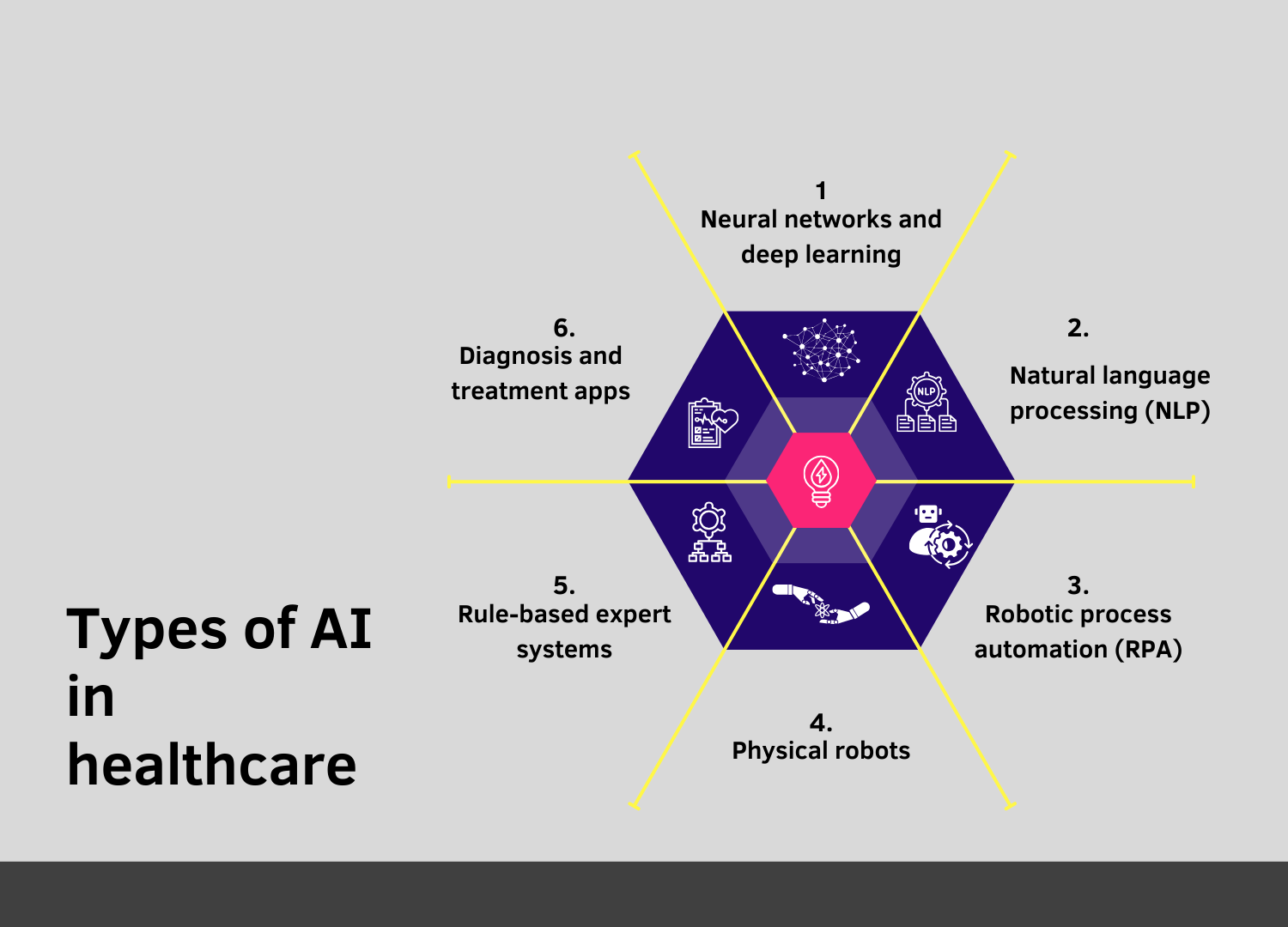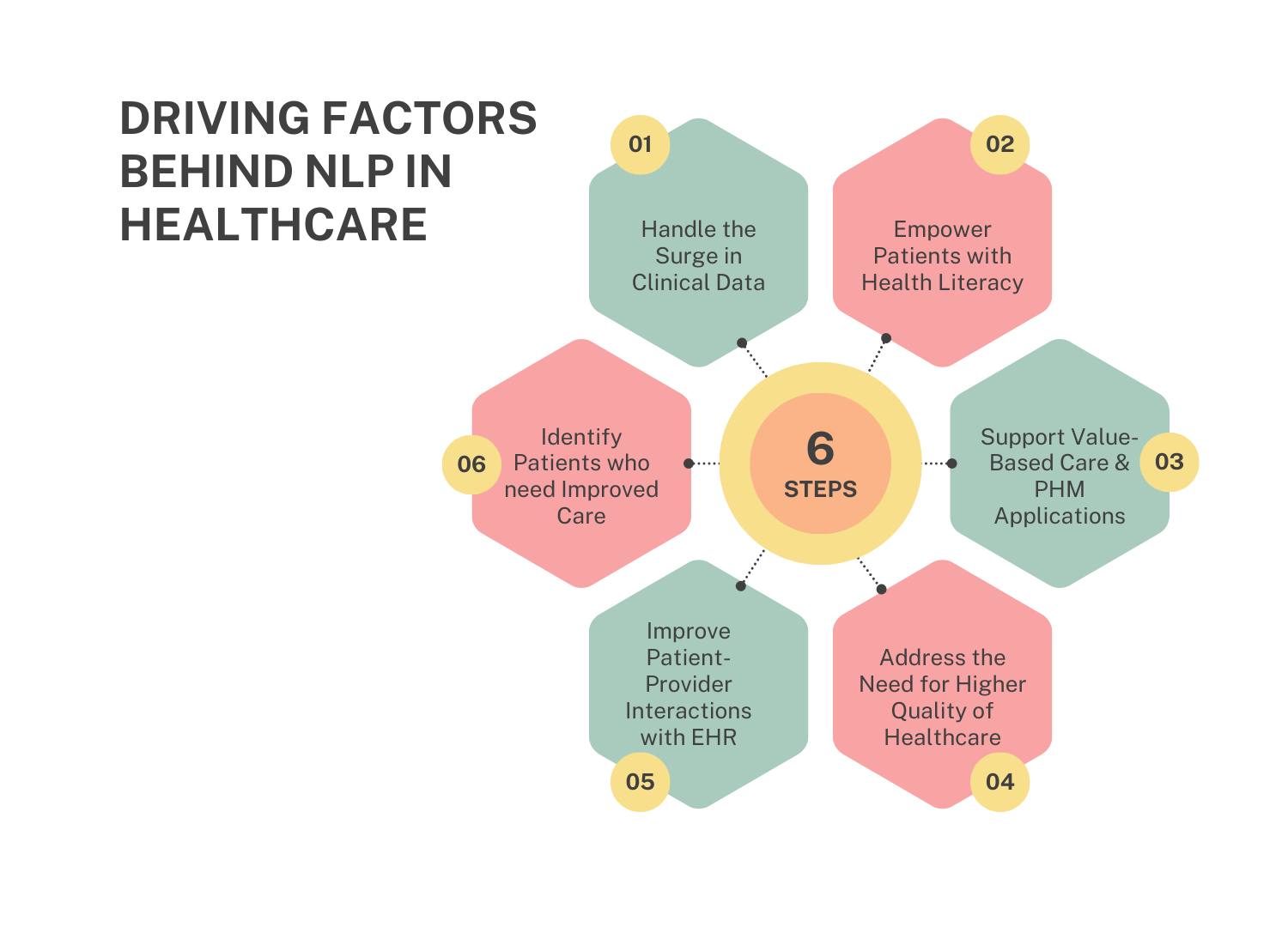Table of Contents
Electronic health records, medical imaging, clinical notes, research papers, and even wearable technology all contribute significantly to the amount of data generated by the healthcare sector. It’s estimated that 80% of this data—text, photos, and audio—is unstructured, making it difficult to obtain useful insights using conventional data mining techniques. With its ability to help computers comprehend spoken and written human language, NLP in healthcare has become a vital technology that may be used to extract hidden value from these massive data sets.
NLP solutions can also improve patient communication, expedite administrative chores, support personalized treatment and predictive analytics, and improve other elements of healthcare outside data. The health providers have been making conscious efforts to find new and innovative ways of surmounting such challenges that emanate from financial constraints, regulatory compliance, and increased workload for doctors with the digital revolution of AI in healthcare. Just one such technological innovation taking over a new playing field in this industry is natural language processing. One of the Artificial Intelligence areas is Natural Language Processing —a field currently revolutionizing health care. Enabling computers to understand and interpret human languages, it’s going to revolutionize the delivery of health care, clinical decision-making, and the outcomes for patients by providing an ability for analysis of unstructured data from a myriad of sources.
Comprehending Natural Language Processing
What is NLP in Healthcare? Natural language processing, or NLP, is the process of interpreting written or spoken language from ordinary contexts by utilizing computer algorithms to recognize important components. The healthcare and life sciences global NLP market, estimated at $4.78 billion in 2023, is projected to reach $50.15 billion by 2033, rising at a compound annual growth rate (CAGR) of 26.4% between 2024 and 2033. To understand and interpret human speech, this multidisciplinary discipline blends machine learning, computational linguistics, and artificial intelligence. Long text blocks can be summarized, unstructured data can be transformed into structured fields, difficult queries may be answered, and NLP solutions can even perform speech and optical character recognition.
Natural language processing services have the important role to understand how the human language works. This is done in order for machines to eventually comprehend human communication more fully by being able to comprehend and interpret human language. A variety of disciplines, including artificial intelligence, computational linguistics, human-computer interaction, etc., are combined to form natural language processing. In NLP, there are numerous approaches to comprehending human language, including machine learning and statistical techniques. These entail disassembling human language into its most fundamental components and then figuring out how those components interact to form sentences with meaning.
You might be wondering why natural language processing algorithms are significant. In other words, it enables computers to comprehend human language and subsequently conduct objective analyses of massive volumes of language-based data. It is quite hard for humans to do this. Furthermore, there are hundreds of dialects of thousands of human languages that are spoken by various people in various ways. NLP solutions help clear up linguistic ambiguities and turn complicated, disorganized, and unstructured data into structured information.
Get Accurate Insights From Your Text Data With Our NLP Solutions
What benefits does NLP offer the healthcare sector?
In essence, machine learning solutions are altering how patients interact with their physicians. Natural language processing algorithms can be used by chatbots and virtual assistant interfaces to create natural language dialogues with patients. They will handle the patients’ concerns, offering them individualized support to answer their questions, making appointments, and reminding them to take their meds. These apps not only increase patient happiness but also serve as a useful tool for expanding the scope of care and improving accessibility.
Generally speaking, the applications of NLP events strengthen the whole healthcare decision-support system in addition to increasing patient participation. Through the reading of millions of medically linked articles, medical records, and diagnostic images, the natural language processing algorithms help clinicians. This therefore captivates the NLP algorithms in order to provide predictive analytics in healthcare, forecast outcomes, and guide the appropriate course of treatment. This accomplishment may consequently lead to a more accurate, customized, and ultimately successful therapeutic decision-making process.
Use Cases and Applications
Clinical Documentation Improvement (CDI)
Natural language processing services are useful for finding important information in reports, clinical records, and even unstructured text. A few computer software applications are purchased to speed up the procedure, reduce error-proneness, and guarantee appropriate patient care.
Clinical Decision Support Systems (CDSS)
The CDSSs use natural language processing services and intelligence to help physicians make evidence-based decisions by interpreting patient data and medical information against the clinical recommendations. It also helps in treatment plans related to drugs, monitoring their interactions, NLP and medical imaging, side effects, and genetically related disorders.
Health Information Extraction
The use of natural language processing services provides the opportunity to appropriately structure the unstructured texts that are commonly found in radiology reports, pathology reports, and electronic health records. Studies on disease control, clinical research, drug discovery and development and community health management can all benefit from this practical information.
Sentiment analysis and patient feedback
NLP services are able to analyze patient input from a variety of sources, like surveys, social networking sites, and online reviews, in order to determine whether or not the patient is satisfied. This allows the systems to identify trends and, ultimately, address issues. The system will identify and recognize hospitals and clinics demonstrating superior patient care and service delivery.
Remote Patient Monitoring and Health Monitoring
Technology can empower patients through natural language health bots and virtual assistants, which gather data and offer personalized recommendations. As a result, NLP in healthcare makes it possible for those working in the healthcare industry to communicate virtually with people who have experienced various diseases. It also has the potential to identify numerous health issues through prompt consultations.
Clinical study Matching
As a result, by searching patient data for the ideal potential patients in accordance with the study’s protocols and criteria, the natural language processing tools will be able to assess trial suitability. Patient recruitment is simple, the study proceeds efficiently and on schedule, and the creation of new medications is completed in a flash.
Automated Clinical Coding and Billing
If accurate data regarding diagnosis, treatment, and services rendered is abstracted from the clinical record, help from NLP will then be available. NLP in healthcare covers each and every stage of revenue cycle management, reducing the possibilities for errors in billing and ensuring proper remuneration.
Analysis of social media, news media, and other sources
In public health surveillance would allow NLP models to monitor status, identify the outbreak of conflicts, and evaluate the effectiveness of the intervention. By doing so, it would also offer a chance for disseminating information associated with epidemics and an early warning system.
Questions of Language Translation and Interpretation
Doctors and other attending staff can communicate, with the help of an interpreter powered by natural language processing services, in cases where patients speak a different language than English or hail from foreign countries. NLP in healthcare makes access to healthcare more equitable and empowers the doctor-patient relationship for both the patient and the medical personnel.

Difficulties in Using NLP for Healthcare
Data Security and Privacy
Medical data is primarily derived from patient files, which may be the largest category in the medical literature. These are the gadgets that enable us to enjoy the highest level of privacy available anywhere. The main issues during the natural language processing algorithms and decision support system analyses, which are an essential component of the entire project, are data security, confidentiality, and integrity of patient information.
Data Quality and Standardization
The biggest issue with medical data is that it is very hard to manage due to its high rate of inaccuracy, incompleteness, and inconsistency (particularly in the domain of unstructured forms, such clinical notes). Natural language processing algorithms have shown to be difficult in terms of accuracy when it comes to data interpretation and the extraction of important information. This leads to inaccurate statistics and frequently misleading information.
Bias and Fairness
Due to inaccurate service coverage and health concerns, bias and network problems with NLP that are not based on a representative data set may play a role. How the algorithm can treat everyone equally is a critical line in the vital fight against prejudice in NLP algorithms, and this is a contributing component to the issue of justice within the health care system.
Interoperability
As NLP in healthcare is incorporated into the current health IT infrastructure, the interoperability problem—a communication barrier that needs to be resolved—must be taken into consideration as a technological necessity. Furthermore, the two main components that integrate NLP in healthcare approaches with workflow are the standardization of interoperability and the governance of zero-censoring.
Ethical and Regulatory Considerations
As the ethical application of NLP in healthcare gained traction, a number of issues including patient insight, accountability, and transparency surfaced. Sometimes, the most important thing is to follow moral principles and follow laws, such as HIPAA in the US, to establish a moral and reliable culture in the healthcare industry.
Unlock The Power of Language By Transforming Your Data Into Insights
Advantages of Applying Natural Language Processing to Healthcare:
Proved Clinical Decision-Making
NLP in healthcare support systems can be useful in diagnosing diseases, predicting patient outcomes, and recommending a personalized treatment plan. This is based on information retrieved from patient and medical records.
Enhanced Patient Engagement and Experience
This is the area where natural language processing -enhanced chatbots and additional healthcare tools, like virtual assistants, support patients by encouraging them to ask questions and provide personalized advice, as well as by helping them when they need it to effectively manage a chronic condition.
Effective Clinical Documentation and Coding
Natural language processing can extract structured data from clinical notes, streamlining clinical coding for accuracy and efficiency
Population Health Management
NLP-based technologies are used to handle large amounts of data for electronic health records (EHRs) and claims data in healthcare settings. These technologies can quickly identify trends in population health, care quality, and patient risk. Based on these insights, well-founded goals, interventions, and resource allocations can be made.
Accelerated Medical Research
Machine learning services are suitable for the analysis of biomedical texts, including genomic information, journal articles, and medical reports, in order to uncover novel disease forms, predictors of drug efficacy and side effects, and strategies for developing new medications and treatments.
Challenges to NLP in Healthcare
Due to high prices and a lack of qualified staff, developing, implementing, and maintaining NLP AI systems in the healthcare industry is severely constrained in terms of money and resources. Subsequently, there exist impediments specific to the industry as well as those resulting from existing constraints, such as in the frameworks used for these instruments’ validation and assessment.
1. Complexity of language
NLP AI systems may become confused by synonyms, polysemy (words with many meanings), and homonyms (words that sound alike) found in medical paperwork)
For example, “heart failure” or “CHF” are other terms for “congestive heart failure.” Similarly, the term “discharge” might refer to liquids draining from a wound or leaving a hospital.
Then, certain phrases have more than one meaning. “010202,” for instance, might be a code, a date, or just a number. up until 2033.
2. Data restrictions
Naturally, medical data is essential for training NLP models, however there are numerous issues:
- Acquiring sufficient data is challenging.
- Data exchange is restricted by privacy concerns.
- Hospitals maintain records in a different way.
- Spread out data might occur in multiple locations.
- Many shortcuts are used in medical notes.
- Certain acronyms might have more than one meaning.
- It is difficult to correctly organize and comprehend the data because of these problems.
3. Integration of systems
When integrating NLP into an organization’s IT infrastructure, it’s important to take into account a number of different elements to make sure the solutions chosen satisfy the unique business requirements and work seamlessly with the systems already in place. Furthermore, healthcare is not a flawless process.
First, there are several formats and systems used to hold medical records. Secondly, modifying current workflows to incorporate natural language processing tools could cause a disturbance to established protocols and necessitate extensive retraining of healthcare personnel. Then there are the frequently intimidating technological obstacles to inter-system operability, which need unique solutions to guarantee efficiency and compatibility.
4. Concerns about regulations and compliance
There is strict regulation of healthcare. NLP and other innovative technologies must abide by stringent regulations and rules pertaining to patient privacy and data security. Strict guidelines are enforced by US regulatory frameworks such as HIPAA to protect medical data. Making sure NLP models adhere to these rules can be difficult and time-consuming.
The adoption process is further complicated by the need to maintain compliance over time because these regulations are subject to change. It’s true that the difficulties we covered are not insurmountable. Furthermore, the potential of NLP in healthcare is well known. The most important thing to keep in mind is that, in order to ensure that the technology meets real-world needs, healthcare practitioners and AI experts must work together effectively during implementation.

Future Trends for NLP in Healthcare
Developments in Machine Learning and AI
As machine learning and intelligence systems, such as deep learning and transformer, LLMs, continue to advance, it is likely that intelligent solutions in natural language processing services will be realized. The goal of these advancements is to make it easier to develop more complex NLP algorithms, including ones that can comprehend or produce phrases at a human level. This will make NLP in healthcare systems an extremely important and crucial tool.
Precision Health and Personalized Medicine
By analyzing a host of unique genetic data, clinical, and lifestyle factors captured through the interactions, NLP in healthcare will go deep in developing patient-centered medicine and precision health programs; that is, tailored interventions and treatments of effectiveness in each individual. In this case, natural language processing algorithms will deal with multi-mode data items and produce competitive insights that might be used in patient care.
Interoperability and Data Integration
Using NLP solutions to handle these data and removing barriers to data exchange may be made possible by the interoperability and integration of health information systems. The current clinical processes and clinical decision support systems can be integrated with NLP technology through the use of common data formats, interoperability standards, and data sharing agreements.
Explainable AI and Interpretability
Putting explainable AI into practice would be one of the next stages toward achieving transparency in the cases of both AI’s blossoming and the health care industry’s increasing use of NLP algorithms. In order to comprehend how algorithms arrive at their conclusions, healthcare providers will thus need to demand transparency and accountability in the insights produced by NLP-based systems. Afterward, artificial intelligence solutions company will utilize the algorithmic recommendations to offer clinical decision-making advice.
Ethical and Regulatory Frameworks
The use of NLP technology in healthcare raises a number of long-term ethical and legal issues. An ethical code and standard standards for applications of NLP will be created by healthcare organizations, legislators, and regulators. These regulations will be specifically designed to prevent misuse and uphold patients’ privacy, autonomy, and well-being.
Natural Language Understanding and Generation
NLP algorithms will be used to improve human language comprehension before building text-generating devices that follow natural language patterns. It is true that using technology to communicate with humans makes sense. The adoption of chatbots, virtual assistants, and conversational agents will be powered by natural language processing services. This change will be adaptable throughout the healthcare industry, providing patients and healthcare providers with individualized support and help.
Conclusion
There is a lot of potential for NLP in healthcare. Yet at the same time there are its very own challenges to solve. Potential key challenges include the complexity of clinical terminology and the need for differentiation among terms and phrases. A large language model development company will have to ensure patients’ privacy and security to avoid ethical issues. The future in the field of NLP and healthcare is bright with the advancement of artificial intelligence and machine learning.
Natural language processing services are quickly emerging as a powerful tool. A tool that will allow healthcare practitioners to tap into the potential of massive amounts of data. This will help to provide patient-centric, efficient, and evidence-based treatment. Furthermore, NLP will enable health care organizations in improving population health management, making better clinical decisions, and providing individual patient care. NLP in healthcare is a revolutionary force. Changing not only technology but transforming patient care and carving out the future of healthcare.
FAQs






